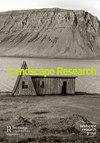How does the World Heritage Sustainable Tourism Programme guide the evolution of rural landscapes?
IF 1.7
3区 社会学
Q3 ENVIRONMENTAL STUDIES
引用次数: 0
Abstract
Abstract Although the World Heritage Sustainable Tourism Programme has great potential for addressing the Sustainable Development Goals, it faces a continual lack of on-the-ground community-level tools. This paper explores the potential for community-level intervention to guide the evolution of rural landscapes under the World Heritage Sustainable Tourism Programme. This community-level intervention comprises three phases (knowledge coproduction, perspective planning and community action) and nine stages (village representative assembly, internalising knowledge workshop, field trip and casual interviews, knowledge demonstration, joint fieldwork, perspective discussions, tangible landscape element design, intangible landscape element coordination, and effectiveness evaluation). Our case study, Dragon Tail Village, reveals that community-level interveners should facilitate community development by recognising the important role of rural communities—co-owners of heritage sites—and rural landscapes—sets of attributes with heritage value. Our findings therefore improve the understanding of the World Heritage Sustainable Tourism Programme’s driving rationale for community development.世界遗产可持续旅游计划如何指导乡村景观的演变?
尽管世界遗产可持续旅游项目在实现可持续发展目标方面具有巨大潜力,但它仍然面临着社区层面工具的持续缺乏。本文探讨了在世界遗产可持续旅游项目下,社区层面干预指导乡村景观演变的潜力。这一社区层面的干预包括三个阶段(知识联合生产、观点规划和社区行动)和九个阶段(村代表大会、内化知识研讨会、实地考察和非正式访谈、知识展示、联合实地考察、观点讨论、有形景观要素设计、无形景观要素协调和效果评估)。我们对龙尾村的案例研究表明,社区层面的干预者应该通过认识到农村社区(遗产遗址的共同所有者)和农村景观(具有遗产价值的一系列属性)的重要作用来促进社区发展。因此,我们的研究结果提高了对世界遗产可持续旅游项目推动社区发展的基本原理的理解。
本文章由计算机程序翻译,如有差异,请以英文原文为准。
求助全文
约1分钟内获得全文
求助全文
来源期刊

Landscape Research
Multiple-
CiteScore
3.70
自引率
16.70%
发文量
63
期刊介绍:
Landscape Research, the journal of the Landscape Research Group, has become established as one of the foremost journals in its field. Landscape Research is distinctive in combining original research papers with reflective critiques of landscape practice. Contributions to the journal appeal to a wide academic and professional readership, and reach an interdisciplinary and international audience. Whilst unified by a focus on the landscape, the coverage of Landscape Research is wide ranging. Topic areas include: - environmental design - countryside management - ecology and environmental conservation - land surveying - human and physical geography - behavioural and cultural studies - archaeology and history
 求助内容:
求助内容: 应助结果提醒方式:
应助结果提醒方式:


